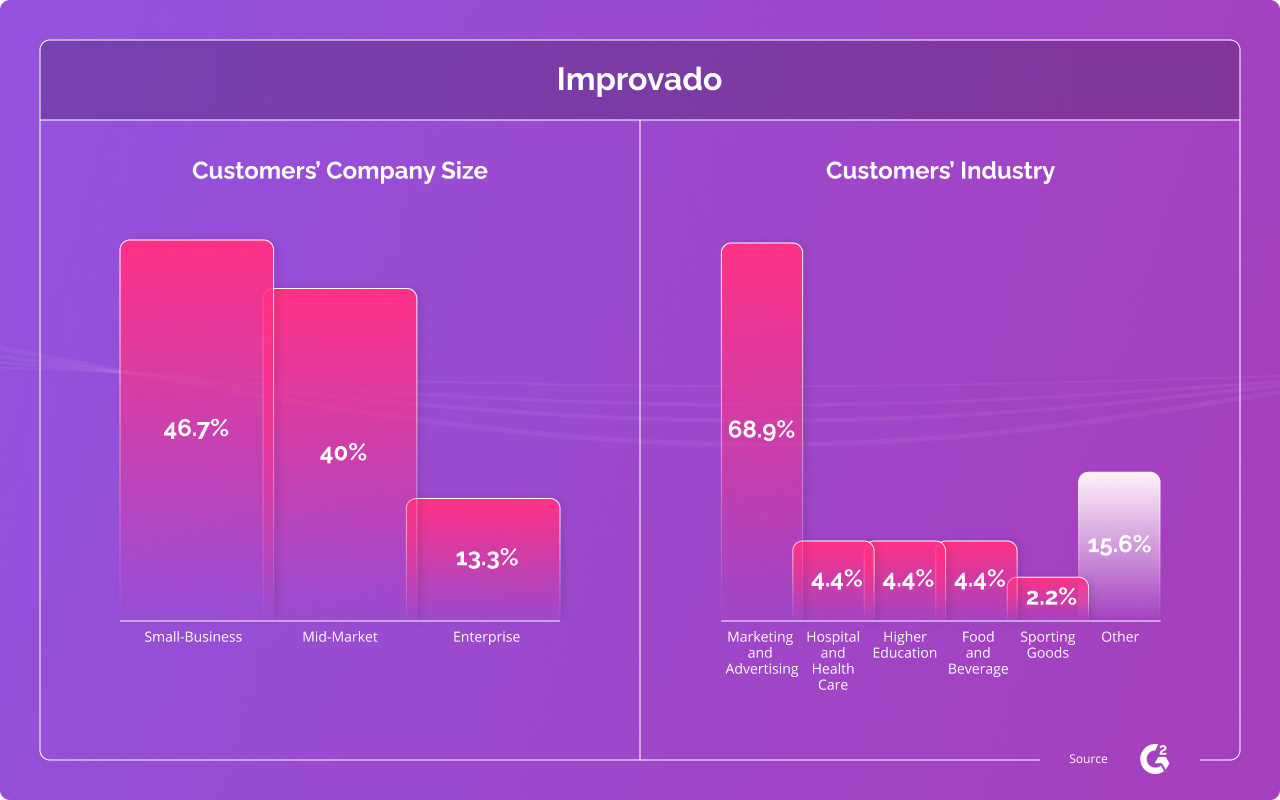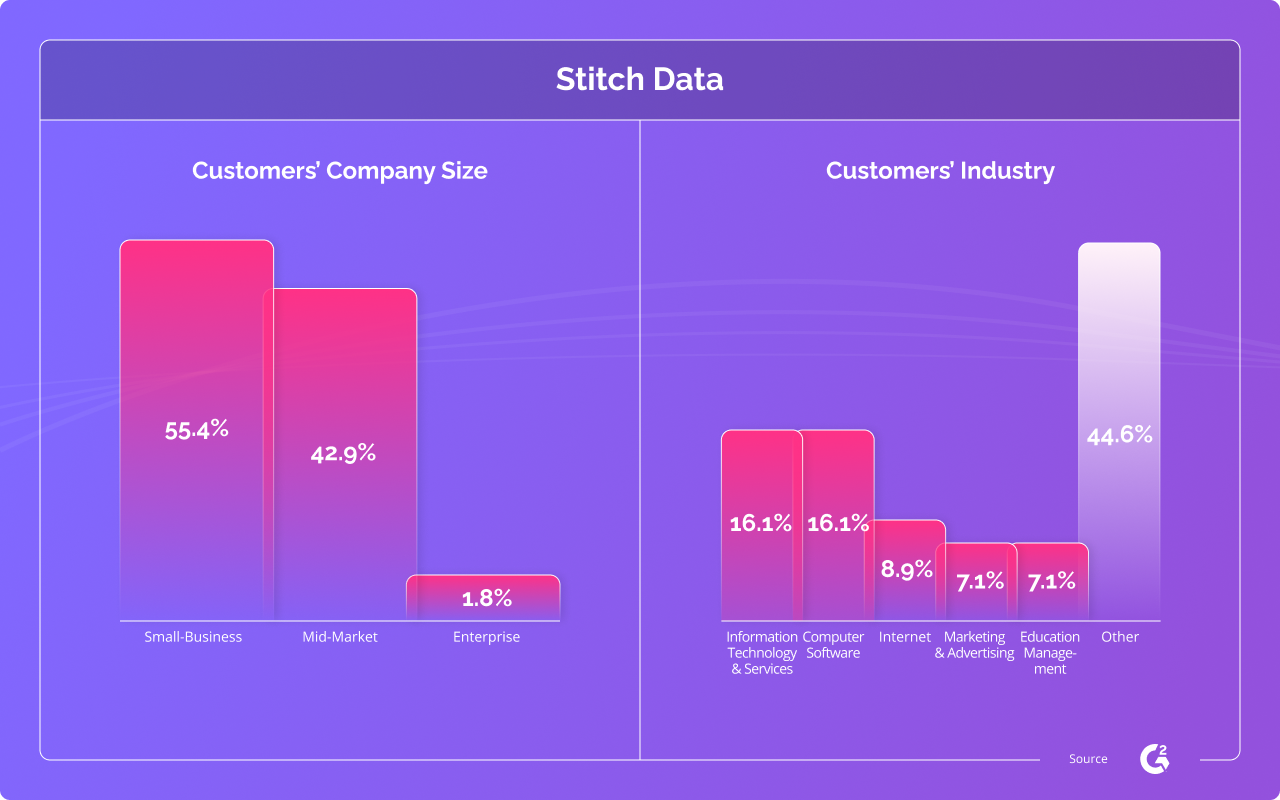Connect over 650 apps and automate workflows. Zapier moves data between your web apps automatically, so you can focus work that matters.
.png)
Connect over 650 apps and automate workflows. Zapier moves data between your web apps automatically, so you can focus work that matters.

Improvado is an enterprise-grade, no-code Revenue Data Platform that automates how marketing, sales, and revenue teams extract, transform and load data from source to destination.
The platform offers prebuilt connectors to over 500 data sources, making it convenient for users who want to efficiently aggregate and push data to data warehouses or to BI, visualization, or analytics tools. Improvado’s clients can also request custom connectors if they need to work with a data source not listed in the integration catalog. Furthermore, the platform offers a high level of granularity, allowing you to explore insights at any level.
Improvado is known for its advanced data transformation engine, known as the Marketing Data Common Model (MCDM). This functionality automatically unifies disparate naming conventions that usually occur when pulling related data from different sources, removes errors and duplicates, and runs automated data mapping and transformation sequences using self-service or prebuilt templates. That way, you can get access to analysis-ready data in no time and start analyzing it in built-in dashboards.
Thanks to its compliance with HIPAA, SOC-2, and enterprise SLA, Improvado is compatible with businesses in privacy-sensitive industries, like health, insurance, and finance.
Improvado is specifically designed for marketing, sales, and revenue teams. Thus, it is fully fitted with features that cater to the needs of these departments and requires zero technical skills.
Marketing, sales, and revenue teams use Improvado to access insights on all revenue-generating efforts across their channels and customer touchpoints. This is powered by Improvado’s efficient marketing attribution modeling functionality that enables users to build custom data pipelines that automatically attribute conversions to the right channels.
As a no-code platform, Improvado is suitable for teams with zero coding skills and SQL knowledge. Improvado also provides professional services to customers who need help with building custom data dashboards, handling data migration, and providing team-wide training. As an add-on, Improvado provides data warehouse maintenance services, freeing up your company’s valuable time and resources.
The platform has users from several industries, encompassing professionals in mid-market brands, large-scale enterprises, and agencies.

Improvado doesn’t tie its users to a specific contract value. Improvado assesses your company’s unique needs when you request a quote and calculates a custom pricing plan best suited for your business.
Improvado’s flexible pricing means you get access to and pay only for the features and bandwidth you need.
Furthermore, Improvado offers a token, called DECS points, which you can spend on APIs, flat file ingestion, report type development and modification, and other development needs.
Improvado has a library of over 500 data sources across several categories, including advertising platforms, CRMs, payment gateways, eCommerce tools, and more. If you can’t find a specific data source in the integration library, you can always request a custom connector, and it will be built for you.
The platform also supports leading data warehouses like Google BigQuery, Amazon RedShift, Snowflake, and more.
Check out a full list of Improvado’s data sources and destinations. The solution also has a comprehensive data dictionary featuring all the metrics, properties, dimensions, and more, as supported by each data source. Take a look here.

.png)

.png)



.png)

.png)
Its amazing how Improvado had the ability to get us the data we need. I highly recommend anyone looking to aggregate their data to use Improvado.

Its amazing how Improvado had the ability to get us the data we need. Simply put, we need to have a lot of flexibility in this industry. I highly recommend anyone looking to aggregate their data to use Improvado.
They really have been a major part of our success and the people there are great to work with.
Improvado provide a reliable foundation that are building our business on top of. The kind of partnership we have with them has truly paid off.

.png)

.png)
Improvado has the most expansive list of connections of any marketing ETL tool I've reviewed. This has saved us an incredible amount of time and money.


Improvado has the most expansive list of connections of any marketing ETL tool I've reviewed. In addition to what the tool already brings in, you can also work with their team to bring in additional or custom connections, as well as any specific dimensions and measures you might need.
Improvado is the most customizable marketing ETL you can use. I highly suggest this for companies/organizations that rely on both standard data sources/metrics as well as custom connections.
With Improvado, we are able to provide marketing analytics as a service at scale. We have reduced our need for in-house developers and can rely solely on Improvado to feed us our clients' data. This has saved us an incredible amount of time and money.
Stitch Data is a cloud-first, open-source ETL platform that enables business teams to rapidly and securely move data from multiple sources to designated data warehouses for fast and efficient analysis.
The platform is an integral part of the Talend Data Fabric, providing prebuilt connectors to over 100 databases and SaaS applications, with support for leading data warehousing platforms like Snowflake, RedShift, BigQuery, and Azure Synapse Analytics.
Stitch Data offers a simple interface with ready-to-query schemas designed to accelerate the process of onboarding and extracting insights from new data sources.
The platform, as stated in one of its documentation pages, does not support user-defined data transformation. This means that you can’t carry out advanced data transformation processes on the platform. It does support and automate a few basic preload transformation processes, like JSON structures, data typing, object names, etc., but these are only sufficient for light- and medium-duty data warehousing needs. Advanced data transformation capabilities can only be accessed by signing up on Talend, Stitch Data’s “parent platform”.
The platform is also compliant with major security protocols, including SOC-2 and HIPAA.
Stitch Data caters to small-, medium-, and large-scale organizations across multiple industries. This includes teams working in transportation, consulting, finance, retail, real estate, SaaS, healthcare, marketing, and more.
The platform offers solutions specifically designed for sales, marketing, and product intelligence teams. Stitch Data supports common marketing and sales data source connectors, like Facebook Ads, Google Analytics, HubSpot, Mailchimp, and others. It sources the data necessary for a high-level overview of performance, but the platform may lack sufficient data granularity to dig deep into campaign, page, and ad analytics.
Product intelligence teams leverage Stitch Data to understand how users interact with products, launch strategies, and ship new features immediately.
The platform offers a few advanced features like multiple destinations, advanced scheduling, and smart cache refreshing, which benefit enterprise companies.

Stitch Stitch Data offers a three-tiered pricing system: Standard, Advanced, and Premium.
Users on the Standard plan can choose to be billed monthly or annually, while users on higher plans pay annually.
For users on the Standard plan, billing starts at $100 for 5 million rows per month and can reach up to $1250 for 300 million rows. Stitch Data also lets users test run the platform for 14 days, free of charge. However, the free trial is only available on the Standard plan.
The Standard plan is best suited for individuals with minimum requirements for their data pipeline. The plan grants access to 10 out of 130 “standard” data sources. Only users on higher plans can use all of the prebuilt data sources, including “enterprise” sources like Amazon RDS, Oracle, Google Analytics 360, and Workday RaaS.
Stitch Data offers integration with 130 SaaS platforms and databases, delivering data to leading destinations (data warehouses, storage platforms, and data lakes) for analysis.
The data sources covered by Stitch Data include apps and platforms used by marketing and sales teams, like Google Analytics, Facebook Ads, Salesforce, SendGrid, etc.
Stitch Data makes provisions for pushing data from custom sources (sources not included in its library). You can use the platform’s Import API or build your own connectors using the Singer framework.
Import API acts as a reception point for arbitrary data sent as JSON files. The received data is then processed and sent to your chosen destination. On the other hand, the Singer framework is an open-source solution that allows you to build your own taps (a fancy word for connectors). However, both methods are highly technical and require coding expertise.
Furthermore, Stitch accepts requests for custom connectors. However, this service is only available to enterprise customers.
Formerly known as Xplenty, Integrate.io is an ETL and ELT platform that lets users build automated pipelines that transform business data into actionable insights in real-time and at scale.
The platform offers integration to over 100 data sources alongside 200+ transformation options, making it easy for users to push analysis-ready data into their required destinations for reporting, analytics, and attribution.
One interesting component of its ETL infrastructure is the reverse ETL tool. This allows users to pull data from warehouses into business platforms like CRMs, marketing automation tools, and analytics platforms for easy activation. The platform also allows users to schedule their pipeline and monitor changes throughout the integration process.
Integrate.io's ELT solution allows users to leverage data replication for unifying data streams into one destination. It offers auto-schema mapping functionalities, which you can use to consistently maintain clean column, row, and table updates.
Marketing teams can use Integrate.io for a wide range of use cases. Some examples include:
Integrate.io provides a range of pricing plans starting from $15,000 a year. These plans are based on the number of data connectors, monthly data processed, scheduling frequency, and other criteria. A free trial is included so customers can explore the features and services available before committing to a plan.
Furthermore, Integrate.io offers a custom Enterprise plan designed to fulfill particular requirements.
Integrate.io natively integrates with 150+ platforms for marketing, sales, customer success, and development teams.
The platform also offers a REST API to connect any database, file storage, or external HTTPS/SOAP service. Furthermore, if you need a custom integration built, Integrate.io allows you to send a direct request.
However, customers complain about a large number of issues that arise during the data extraction process, which is especially true for companies processing large volumes of data. Customers mention latency in data connectors, that API limits are very quickly achieved, and how they were charged for a connector that failed to integrate much-needed data. All in all, data extraction shortcomings may come in the way of scalability.
Blendo is a self-serving integration-as-a-service platform. It enables you to collect and sync your data using any data warehouse. Such data warehouses can be sourced from a variety of departments (e.g., sales, marketing, customer support, product, etc). Blendo also emphasizes the speed with which you can build a full data infrastructure that is fresh and aligned with the rest of the data in your company.
If you’re interested in Blendo, but want to be certain before you make the purchase, we’ve compiled a list of platforms similar to Blendo to help you compare your options.
Blendo doesn’t provide any pricing information on their site, so you will need to contact the company for a quote. There is a 14-day free trial offered.
Cloud Elements is an API integration platform. As one of the only virtualized API integration platforms, it enables a one-to-many integration format as well as canonical data models for basic functions. Amongst its most commendable features includes over 200 integrations. These integrations allow advanced features such as search capabilities, unified error handling, normalized authentication, and many more. As such, using Cloud Elements, you have the ability to construct and build the most suitable platform for you.
Pricing is not included on Cloud Element’s website and companies should make contact with them to get detailed pricing information.
Dataddo is a cloud-based data integration and marketing reporting platform that helps companies aggregate data from various sources, automate data pipelines and generate dashboards.
It offers granular control over data storage (including vendor lock avoidance), manual, advanced, and SQL transformations, pre-built templates and dashboards, data quality checks, 24/7 customer support, and professional services, such as onboarding, training, and consulting.
The platform is designed to be user-friendly and intuitive with drag-and-drop capabilities, allowing users to quickly set up data integrations and pipelines. It integrates with a wide range of third-party visualization tools, such as Tableau, Power BI, and Qlik, supports numerous destinations, including cloud storage, databases, and analytics tools, and offers custom sources, transformations, and scheduling options.
The platform is also compliant with major security protocols, including SOC-2, GDPR, and HIPAA.
Dataddo is built for marketing teams and professionals aiming to streamline their data collection, transformation, and analysis processes. The platform can be used for a range of use cases, including:
Dataddo pricing is based on the number of data sources and data flows used. Pricing plan allows customers to buy licenses or subscriptions that can be renewed annually or monthly.
There are four different types of plans: Free, Data to Dashboards, Data Anywhere, and Headless:
Dataddo integrates with over 200 data sources, including databases, storage solutions, marketing and analytics tools, social media platforms, and visualization solutions. Additionally, Dataddo pulls data from some finance, HR, and accounting platforms.
If you need a specific integration that isn’t available in the prebuilt integration library, Dataddo will build a new connector within 10 business days.
Some Dataddo users mention that data sources can fail at any time, experience delays, push low-quality data, and require constant maintenance. These issues may require your team to push data manually and spend time fixing the problems, instead of building dashboards or deriving insights.
Workato is a popular choice among ETL tools (Extract, Transform and Load), and it works with thousands of satisfied customers. It offers real-time results from business events without any coding necessary. The platform makes use of machine learning and advanced technology to provide fast and smooth service.
This is an enterprise automation platform that is great for all kinds of companies, from SaaS startups to IT teams and E-commerce businesses.
The tool is designed to be an all-in-one platform to help digital marketers and agencies with reporting, call tracking, and monitoring. Ninjacat integrates with the commonly used social media, SEO, PPC, call tracking, and display channels used by marketers, offering a way to automate reporting and monitor campaigns and budgets. The tool boasts that it offers over 750 data sources. If you need a single platform for SEO, PPC, and other reporting, Ninjacat may be a good option, however, the cost may be a bit too much for small businesses.
Ninjacat charges its users based on a subscription. The company does offer a free trial.
The platform claims to eliminate the marketing dilemma, gathering both offline and online data from various sources, including custom data sources and sales data. The tool then feeds the gathered data into whichever BI tool you care to use.
Alight Analytics doesn’t provide information about the cost of its ChannelMix platform. You have to contact the company for a quote.
Sorts aggregated data neatly